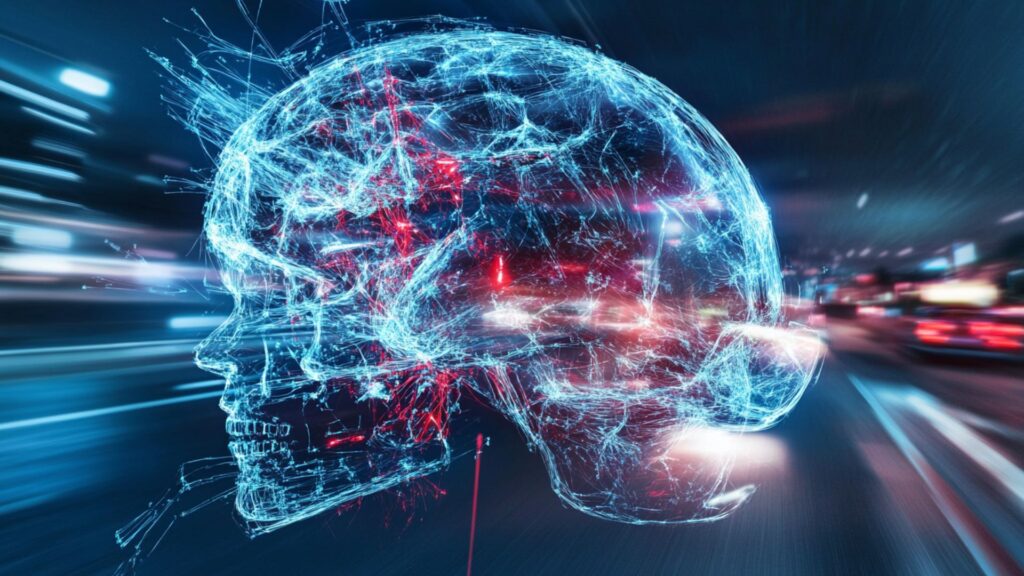A car crash can do more than harm the body; it can affect the brain. The sudden impact or force may cause a traumatic brain injury (TBI). It ranges from mild concussions to severe damage. These injuries disrupt how the brain functions, leading to cognitive changes. Memory loss after a car accident is a common issue. Victims struggle to recall events, facts, or even daily tasks. This happens because the brain’s networks, especially in areas like the hippocampus, can get damaged.
Other cognitive effects include trouble focusing, slower thinking, or mood changes. These aren’t just physical symptoms but stem from neurological disruptions in brain signaling and structure. Inflammation, swelling, or bleeding in the brain can worsen these effects. Even mild crashes can cause subtle changes, like difficulty concentrating, that linger for weeks or months. Understanding these neurological impacts is key to proper treatment and recovery. The brain’s complex wiring needs time and care to heal.
Key Signs of the Problem
Cognitive changes after a car crash often signal neurological issues. These changes affect memory, focus, and mood, stemming from disrupted brain networks. There are common symptoms linked to memory loss and brain fog after a crash. They indicate the brain’s complex wiring needs careful evaluation and treatment. Let’s examine them:
- Brain Fog. Brain fog after a crash feels like mental cloudiness. Thinking becomes slow, and focusing is hard. This stems from disrupted brain signaling, often in mild TBIs or concussions.
- Difficulty Concentrating. Tasks requiring attention, like reading or working, become challenging. The brain’s frontal lobe manages focus and may be affected by the crash impact.
- Confusion. Victims may feel disoriented or struggle to follow conversations. This relates to impaired neural connections, especially after a concussion.
- Mental Confusion. Processing information takes longer after a car crash. Simple decisions feel overwhelming due to disrupted brain networks.
- Mood Changes. Irritability, anxiety, or depression can emerge. The brain’s emotional regulation areas, like the amygdala, may be impacted by trauma.
- Headaches. Persistent headaches often accompany cognitive issues. They signal brain inflammation or pressure from the injury.
These symptoms highlight why memory loss after a car accident is neurological, not just physical. The brain’s complex wiring gets disrupted, affecting memory, focus, and clarity. Even mild crashes can cause these issues, which may last weeks or months. Early recognition is crucial for treatment, as symptoms can worsen without care. Seeking medical evaluation helps identify the extent of brain injury and guides recovery. The most common approaches include neurological testing and imaging.
What Causes It Neurologically?

Car crashes can cause neurological damage that leads to cognitive impairment and thinking problems. Below are the key neurological reasons:
- Brain Trauma. A TBI occurs when the head hits an object or the brain jolts inside the skull. This disrupts neural pathways, causing cognitive impairment.
- Hippocampal Damage. The hippocampus, vital for memory, often gets injured. This leads to memory loss and thinking problems after TBI. New information is hard to process.
- Frontal Lobe Injury. The frontal lobe controls focus and decision-making. Damage here causes difficulty concentrating and slowed thinking. This contributes to cognitive impairment after crashes.
- Axonal Shearing. Rapid head movement tears nerve fibers called axons. This disrupts communication between brain regions. It leads to thinking problems after TBI, like confusion or brain fog.
- Inflammation. Brain injury triggers inflammation throughout affected areas. Swelling presses against brain tissue and worsens cognitive impairment. This causes headaches or fatigue.
- Blood Flow Disruption. Crashes can reduce blood flow to brain areas. Oxygen-starved regions impair thinking and contribute to problems after TBI.
- Neurotransmitter Imbalance. TBI disrupts chemicals like dopamine or serotonin. This affects mood and cognition, leading to irritability or cognitive impairment.
- Secondary Damage. Bleeding or swelling after crashes damages nearby brain tissue. This delays recovery and worsens thinking problems after TBI.
These neurological changes explain why thinking problems after TBI occur. Damage to brain structures and signaling disrupts memory, focus, and clarity. Early medical intervention, including imaging and therapy, is critical to assess and treat these issues effectively.
Identifying Damage Early
Car crashes can cause hidden brain injuries that affect cognitive function. Early detection is key to treatment. Below are ways these symptoms indicate neurological damage:
- Difficulty Focusing. Inability to concentrate on simple tasks reflects poor post-accident brain function. This indicates frontal lobe injury, affecting attention and decision-making.
- Memory Problems. Some individuals struggle to remember the accident or perform everyday tasks. This indicates impaired brain function after the accident and suggests hippocampal damage from TBI.
- Headaches. Persistent headaches after a crash may indicate brain inflammation or pressure. This ties to mental confusion after a car crash and hidden TBI.
- Brain Fog. Feeling mentally cloudy or slow relates to mental confusion after a car crash. It suggests diffuse axonal injury, disrupting brain signaling.
- Mood Swings. Sudden irritability or anxiety can signal neurological issues. Altered brain function after accidents in the amygdala affects emotional regulation.
These symptoms reveal hidden brain injuries by showing how the brain struggles after crashes. Post-accident brain function and mental confusion indicate neurological damage. Early medical evaluation, such as CT scans or neurological tests, is crucial. Prompt diagnosis can prevent worsening symptoms and guide recovery through therapy or medication.
Diagnosis Methods You Should Know

Car crashes can trigger neurological issues like memory loss after a car accident. Medical exams and evaluations help uncover these problems. Below are the standard diagnostic methods:
- CT Scan. A CT scan uses X-rays to view the brain. It detects bleeding, swelling, or fractures linked to memory loss after car accidents.
- MRI. An MRI shows detailed brain images. It spots subtle damage, like axonal injuries, causing brain processing slowdown.
- Neurological Exam. Doctors check reflexes, coordination, and senses. This evaluates brain function and identifies memory loss after a car accident.
- Cognitive Testing. Tasks assess memory, attention, and reasoning. Struggles indicate brain processing slowdown or mental issues.
- Glasgow Coma Scale (GCS). This tests consciousness via eye, verbal, and motor responses. Low scores suggest severe injury tied to memory loss from car accidents.
- Electroencephalogram (EEG). An EEG measures brain electrical activity. Irregular patterns show disruptions, causing brain processing slowdown.
- Neuropsychological Assessment. Specialists test memory, problem-solving, and behavior. Results reveal impairments like memory loss after car accidents.
- Blood Tests. These detect brain injury biomarkers, like trauma-related proteins. High levels signal brain processing slowdown.
- Symptom Questionnaires. Patients report issues like forgetfulness or slow thinking. Responses help diagnose memory loss after a car accident.
- Vestibular Testing. This checks balance and eye movements. Abnormal results may indicate brain injury linked to brain processing slowdown.
These diagnostic tools identify brain injuries by examining structure, function, and symptoms. Detecting memory loss after a car accident early is critical. Clinical tests and patient feedback guide doctors in confirming injuries and planning recovery. They reduce the risk of long-term effects.
Treatment & Care Options
Car crashes can lead to cognitive impairment that requires targeted neurological care. Below are treatment and care options:
- Medical Evaluation. Doctors assess brain injuries with imaging or tests. This guides treatment for cognitive impairment.
- Medication. Anti-inflammatory drugs reduce brain swelling. Antidepressants or anti-anxiety meds help mood issues tied to brain fog after a crash.
- Cognitive Rehabilitation. Therapy improves memory, attention, and problem-solving. It targets cognitive impairment through structured exercises.
- Speech Therapy. Therapists help with communication or word-finding issues. This addresses brain fog after a crash affecting speech.
- Occupational Therapy. Therapists teach strategies for daily tasks. This supports recovery from cognitive impairment impacting routines.
- Physical Therapy. Exercises improve balance and coordination. It helps reduce dizziness linked to brain fog after a crash.
- Neuropsychological Therapy. Specialists address emotional and cognitive challenges. This targets cognitive impairment, such as mood swings or memory issues.
- Rest and Recovery. Resting the brain avoids overstimulation. Limiting screen time helps reduce brain fog after a crash.
- Support Groups. Connecting with others offers emotional support. Sharing experiences helps cope with brain fog after a crash.
- Lifestyle Changes. Healthy diet, sleep, and stress management aid recovery. These support brain healing from cognitive impairment.
These treatments focus on healing the brain and restoring function. Brain fog after a crash improves with a mix of medical care, therapy, and lifestyle adjustments. Early intervention is key to preventing long-term issues. Neurologists, therapists, and support networks guide recovery. They help patients regain clarity and cognitive abilities through tailored care plans.
When to See a Specialist
Car crashes can cause severe brain issues needing specialist care. Specific symptoms demand immediate attention from a neurologist or TBI expert. When should you seek help?
- Persistent Memory Issues. Ongoing memory loss or forgetting daily tasks requires a specialist. Neurologists can provide comprehensive testing and assessment.
- Severe Confusion. Trouble understanding or disorientation signals brain injury. TBI experts can offer specialized evaluation and treatment.
- Worsening Headaches. Intense or frequent headaches suggest brain swelling. Imaging specialists can determine the underlying cause.
- Trouble Speaking. Difficulty finding words or slurred speech needs urgent care. Speech therapists can help with communication issues.
- Mood Changes. Sudden irritability or depression indicates neurological issues. Neuropsychological evaluations can assess these changes.
- Balance Problems. Dizziness or trouble walking may point to brain damage. Vestibular specialists can evaluate and treat balance issues.
These symptoms show serious brain issues needing prompt care. Memory loss and related signs after car accidents shouldn’t be ignored. Professional medical evaluation provides tailored advice and connects you to specialists for diagnosis and treatment. This ensures faster recovery and better outcomes. Contact our healthcare provider for immediate assistance if you experience these symptoms.
